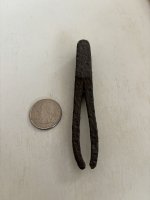DeepseekerADS
Gold Member
- Mar 3, 2013
- 14,880
- 21,725
- Detector(s) used
- CTX, Excal II, EQ800, Fisher 1260X, Tesoro Royal Sabre, Tejon, Garrett ADSIII, Carrot, Stealth 920iX, Keene A52
- Primary Interest:
- Other
Let's not get political on this. The police are NOT our enemy.
Jason Richards 12/9/14
Police brutality has made the recent headlines everywhere. There are something that may get you into trouble when dealing with them even although you are completely innocent.
Here's a short list of do's and don'ts:
1. Keep your hands in view.
2. Don't make sudden movements.
3. Avoid passing behind them. Nervous police are dangerous police.
4. Never touch the police or their equipment (vehicles, flashlights, animals, etc.) - you can get beat up and charged with assault.
The police do not decide your charges; they can only make recommendations. The prosecutor is the only person who can actually charge you. Remember this the next time the police start rattling off all the charges they're supposedly "going to give you."
5. Questioning
Interrogation isn't always bright lights and rubber hoses - usually it's just a conversation. Whenever the police ask you anything besides your name and address, it's legally safest to (respectfully) say these Magic Words:
"I am going to remain silent. I want to see a lawyer."
This invokes the rights which protect you from interrogation. When you say this, the police (and all other law enforcement officials) are legally required to stop asking you questions. They probably won't stop, so just repeat the Magic Words or remain silent until they catch on.
Remember, anything you say to the authorities can and will be used against you and your friends in court. There's no way to predict what information the police might try to use or how they'd use it. Plus, the police often misquote or lie altogether about what was said. So say only the Magic Words and let all the police and witnesses know that this is your policy. Make sure that when you're arrested with other people, the rest of the group knows the Magic Words and promises to use them.
One of the jobs of the cops is to get information out of people, and they usually don't have any scruples about how they do it. Police are legally allowed to lie when they're investigating, and they are trained to be manipulative. The only thing you should say to police, other than identifying yourself, is the Magic Words: "I am going to remain silent. I want to see a lawyer."
Here are some lines they will give you:
"You're not a suspect - just help us understand what happened here and then you can go."
"If you don't answer my questions, I'll have no choice but to arrest you. Do you want to go to jail?"
"If you don't answer my questions, I'm going to charge you with resisting arrest."
"All of your friends have cooperated and we let them go home. You're the only one left."
Unfortunately, recently police are getting sneaky and there are lots of ways they can trick you into talking. Here are some scams they'll pull:
Good Cop/ Bad Cop: Bad cop is aggressive and menacing, while good cop is nice, friendly, and familiar (usually good cop is the same race and gender as you). The idea is bad cop scares you so bad you are desperately looking for a friend. Good cop is that friend.
The police will tell you that your friends ratted on you so that you will snitch on them. Meanwhile, they tell your friends the same thing. If anyone breaks and talks, you all go down.
The police will tell you that they have all the evidence they need to convict you and that if you "take responsibility" and confess the judge will be impressed by your honesty and go easy on you. What they really mean is: "we don't have enough evidence yet, please confess."
Jail is a very isolating and intimidating place. It is really easy to believe what the police tell you. Insist upon speaking with a lawyer before you answer any questions or sign anything.
The Golden Rule: Never trust a cop.
Next time, I'll show you more tips on how to protect yourself.
Stay safe. Stay prepared.
Jason Richards
Jason Richards 12/9/14
Police brutality has made the recent headlines everywhere. There are something that may get you into trouble when dealing with them even although you are completely innocent.
Here's a short list of do's and don'ts:
1. Keep your hands in view.
2. Don't make sudden movements.
3. Avoid passing behind them. Nervous police are dangerous police.
4. Never touch the police or their equipment (vehicles, flashlights, animals, etc.) - you can get beat up and charged with assault.
The police do not decide your charges; they can only make recommendations. The prosecutor is the only person who can actually charge you. Remember this the next time the police start rattling off all the charges they're supposedly "going to give you."
5. Questioning
Interrogation isn't always bright lights and rubber hoses - usually it's just a conversation. Whenever the police ask you anything besides your name and address, it's legally safest to (respectfully) say these Magic Words:
"I am going to remain silent. I want to see a lawyer."
This invokes the rights which protect you from interrogation. When you say this, the police (and all other law enforcement officials) are legally required to stop asking you questions. They probably won't stop, so just repeat the Magic Words or remain silent until they catch on.
Remember, anything you say to the authorities can and will be used against you and your friends in court. There's no way to predict what information the police might try to use or how they'd use it. Plus, the police often misquote or lie altogether about what was said. So say only the Magic Words and let all the police and witnesses know that this is your policy. Make sure that when you're arrested with other people, the rest of the group knows the Magic Words and promises to use them.
One of the jobs of the cops is to get information out of people, and they usually don't have any scruples about how they do it. Police are legally allowed to lie when they're investigating, and they are trained to be manipulative. The only thing you should say to police, other than identifying yourself, is the Magic Words: "I am going to remain silent. I want to see a lawyer."
Here are some lines they will give you:
"You're not a suspect - just help us understand what happened here and then you can go."
"If you don't answer my questions, I'll have no choice but to arrest you. Do you want to go to jail?"
"If you don't answer my questions, I'm going to charge you with resisting arrest."
"All of your friends have cooperated and we let them go home. You're the only one left."
Unfortunately, recently police are getting sneaky and there are lots of ways they can trick you into talking. Here are some scams they'll pull:
Good Cop/ Bad Cop: Bad cop is aggressive and menacing, while good cop is nice, friendly, and familiar (usually good cop is the same race and gender as you). The idea is bad cop scares you so bad you are desperately looking for a friend. Good cop is that friend.
The police will tell you that your friends ratted on you so that you will snitch on them. Meanwhile, they tell your friends the same thing. If anyone breaks and talks, you all go down.
The police will tell you that they have all the evidence they need to convict you and that if you "take responsibility" and confess the judge will be impressed by your honesty and go easy on you. What they really mean is: "we don't have enough evidence yet, please confess."
Jail is a very isolating and intimidating place. It is really easy to believe what the police tell you. Insist upon speaking with a lawyer before you answer any questions or sign anything.
The Golden Rule: Never trust a cop.
Next time, I'll show you more tips on how to protect yourself.
Stay safe. Stay prepared.
Jason Richards





